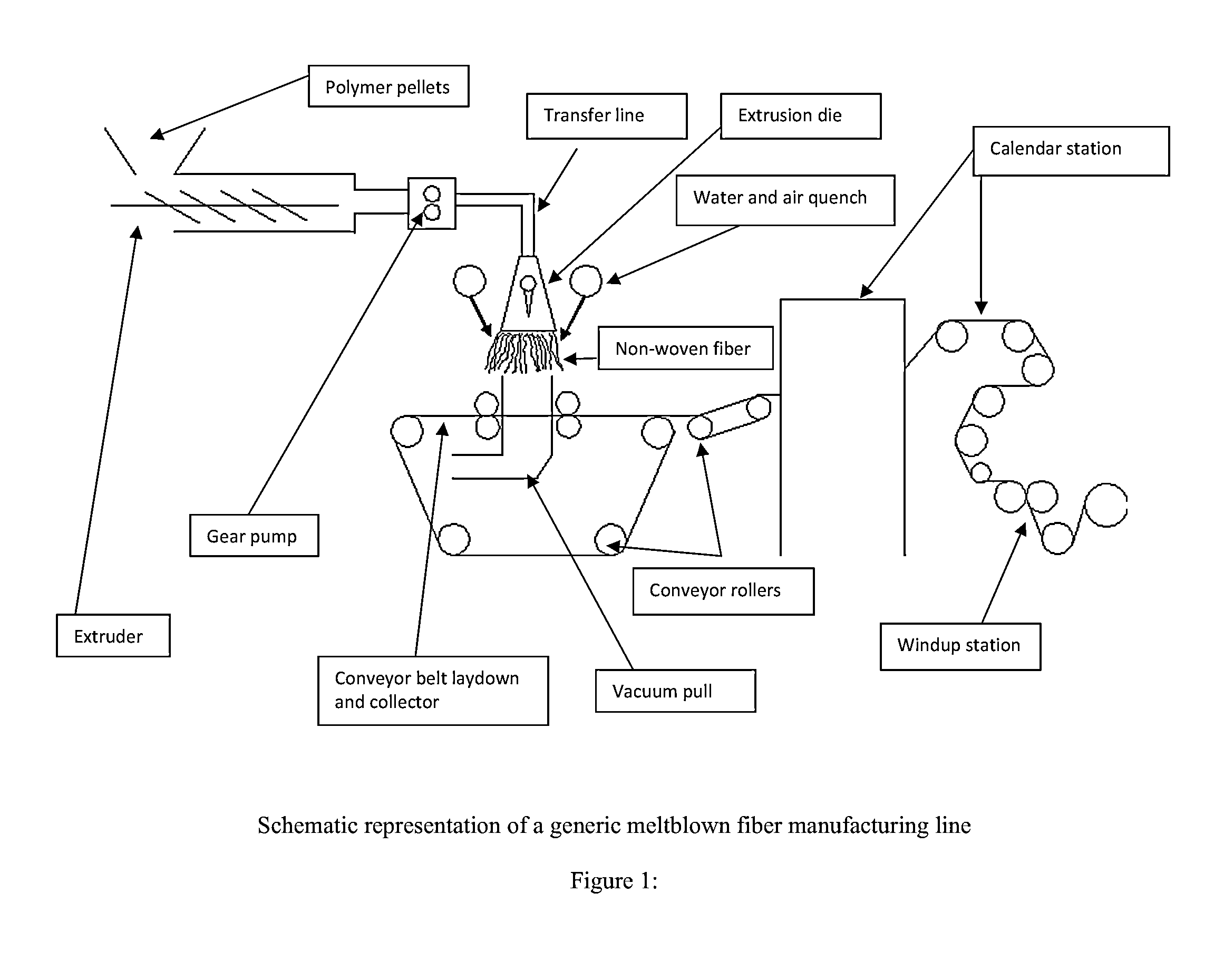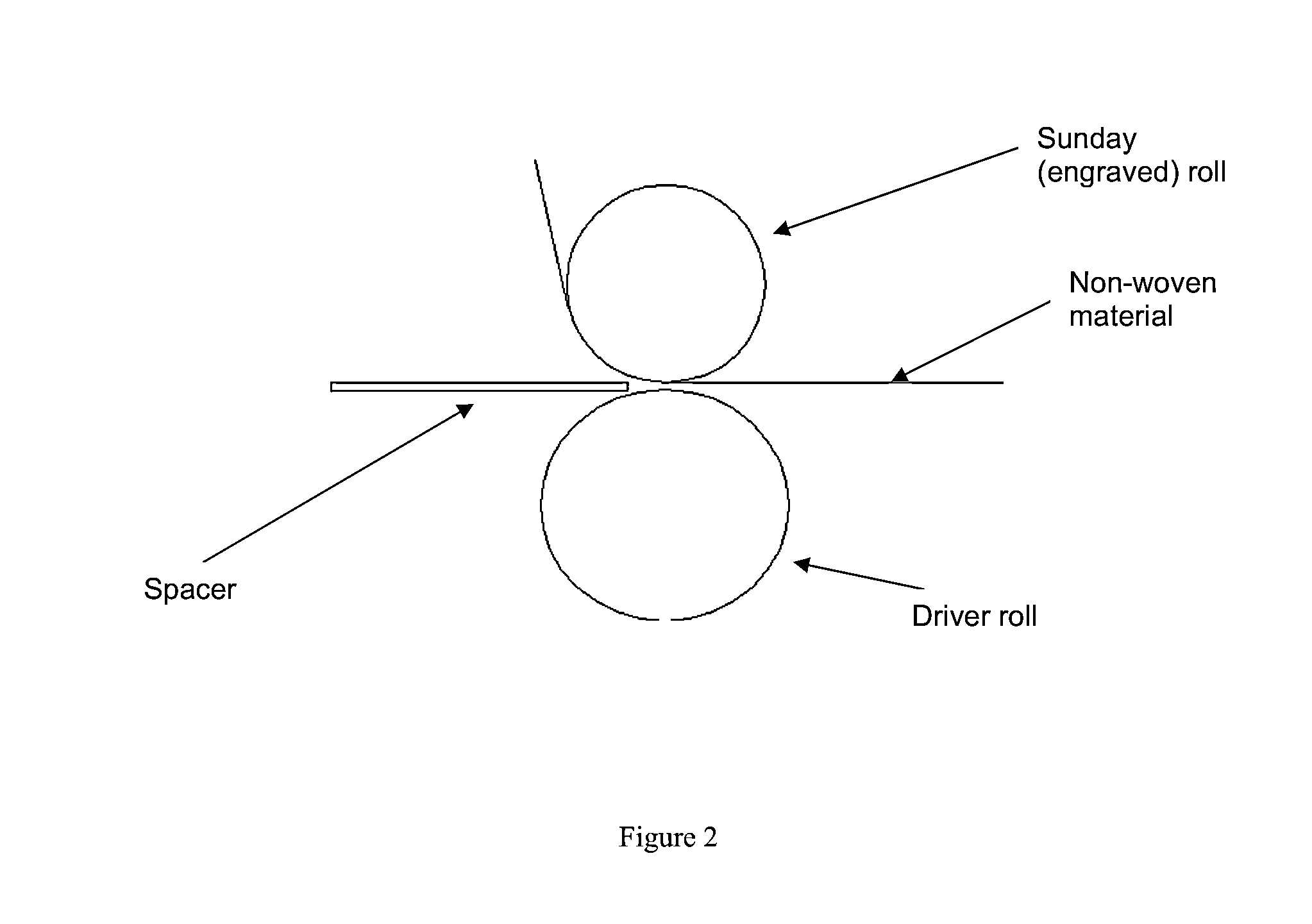Biodegradable Polymer Non-woven Absorbent Pad with Absorbency and Antimicrobial Chemistry
- Summary
- Abstract
- Description
- Claims
- Application Information
AI Technical Summary
Benefits of technology
Problems solved by technology
Method used
Image
Examples
example 1
Creation of the PLA Non-Woven Food Pad Insert
[0074]Grade 6202D PLA polymer pellets from NatureWorks (Minnetonka, Minn.) were utilized from a fresh unopened bag and introduced into the mouth of a 2.5″ 30:1 40-hp extruder and exposed to mechanical shear and heat ranging from approximately 325 to 425° F. as it travels through the system. Filtration followed by a gear pump pushed the molten polymer thru a heated transfer line into a BIAX meltblown system at approximately 800 to 2000 psi. Compressed air was heated to approximately 475-525° F. and introduced into the die at approximately 10-18 psi and used to attenuate the PLA fibers thru nozzles with an internal diameter of about 0.012 inches. A filtered water mist quench was produced using a high-pressure piston pump and a fluid-misting system. This quench was operated at approximately 500-1800 psi and the mist impinges the fibers as they exit the die zone and serves to cool them. An air quench system introduced cool outside air to the ...
example 2
Inclusion of SAP in Fibrous Active Structure with Adhesive in PLA Food Pad Insert
[0077]In this example, superabsorbent polymer (SAP) was added (crosslinked polyacrylic acid grade Favor®Pac 530 from Emerging Technologies / Stockhausen (Greensboro, N.C.); approved by the FDA) as an indirect food additive. The SAP was granular and was dispensed uniformly via a powder spreader produced by Christy Machine Co. (Fremont, Ohio). The granules were dispersed directly into the fiber stream or simply between layers of fibers that have already been formed. It can be advantageous to utilize a pressure sensitive adhesive to construct a more robust structure and contain the SAP to prevent particles from dislodging and possibly contaminating the food. In this example an ITW Dynatec (Hendersonville, Tenn.) UFD fiber spray system was used to spray adhesive fibers between the meltblown webs and SAP granules followed by a nip roll to insure good contact with the adhesive. Many adhesives can be used includ...
example 3
Inclusion of SAP in Fibrous Active Structure without Adhesive in PLA Food Pad Insert
[0080]We also utilized the dispersion and capture of the SAP between the layers of fibers by calendaring the two film layers. We used a BF Perkins (division of Standex Engraving, LLC, Sandston, Va.) Calendar Station which contained two heated rolls and two hydraulic rams. Each heated roll was filled with high temperature oil, which was heated by a separate machine. A hot oil machine controlled the temperature and the flow of oil through each zone of the Calendar Station. The temperature can range from 110 to 550° F. The hot oil was circulated at 30 psi through 2 inch iron pipes into a rotary valve for each zone.
[0081]The Calendar Station was opened and closed by a control station which also regulated the amount of pressure used to move the hydraulic rams. This pressure can range from 1 psi to 3,000 psi and maintained the amount of force with which the Drive Roll was supported. A variable spacer betwe...
PUM
| Property | Measurement | Unit |
|---|---|---|
| Thickness | aaaaa | aaaaa |
| Color | aaaaa | aaaaa |
| Electrical resistance | aaaaa | aaaaa |
Abstract
Description
Claims
Application Information
 Login to View More
Login to View More - R&D
- Intellectual Property
- Life Sciences
- Materials
- Tech Scout
- Unparalleled Data Quality
- Higher Quality Content
- 60% Fewer Hallucinations
Browse by: Latest US Patents, China's latest patents, Technical Efficacy Thesaurus, Application Domain, Technology Topic, Popular Technical Reports.
© 2025 PatSnap. All rights reserved.Legal|Privacy policy|Modern Slavery Act Transparency Statement|Sitemap|About US| Contact US: help@patsnap.com



